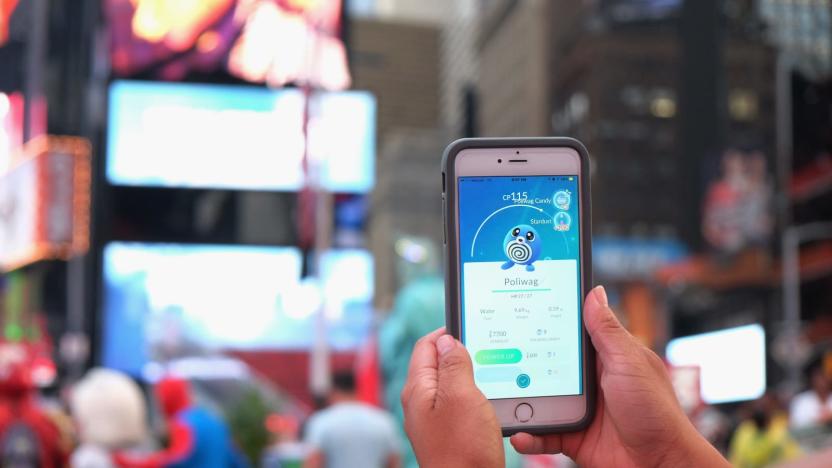sexoffenders
Latest

Supreme Court rules sex offenders can use social networks
It's understandable why governments would want to keep sex offenders away from social networks -- you don't want predators messaging their potential targets. Is an outright ban taking things a step too far, though? The US Supreme Court thinks so. As part of a ruling in a case where a college student preyed on an underage girl, the court has struck down a North Carolina law preventing sex offenders from visiting social internet sites that children might frequent. Simply speaking, the law was so broad that it violated free speech rights, disconnecting offenders from modern life.

New York bill would ban 'Pokémon Go' stops near sex offenders
New York state might not just ban sex offenders from playing games like Pokémon Go -- it may eliminate the incentives for them to play, too. A group of senators have introduced a bill that would prevent augmented reality game developers from placing objectives (such as pokéstops) within 100 feet of where a registered sex offender lives. Companies that don't heed the warning could face fines of up to $100 per day for every location that violates the legislation.

New York Governor bans sex offenders from 'Pokémon Go'
New York Governor Andrew Cuomo has forbidden registered sex offenders in his state from downloading and playing Pokémon Go and similar augmented reality games. According to a statement released Monday morning, the Department of Corrections and Community Supervision will apply the governor's directive to "nearly 3,000 Level 1, 2 and 3 sex offenders currently on parole" in the state of New York.

Google sheds light on its child porn detector after sex offender arrest
Thanks to Google, a sex offender was recently arrested after the company tipped off authorities about finding illegal photos of children in his email. Despite the good that came out of it, it raised a number of questions, such as "does Google regularly look into the contents of our email?" A Gmail spokesperson has gotten in touch with AFP to clear the air and revealed that each image that depicts child sexual abuse actually has a unique digital fingerprint, which a special Google technology can detect. While the spokesperson didn't talk about it in detail, that technology might be what the company supposedly developed last year: a system that can trawl the web and email accounts for child sex images. Gmail's rep made clear, however, that Mountain View only uses the system to detect child porn -- it can't actually parse emails that contain details of any other criminal activity, like burglary.

Google email scan helps police arrest a sex offender
Google has long used automatic image scanning to fight online child exploitation, but it's now clear that this monitoring applies to email, too. Houston police have arrested a registered sex offender after Google tipped them off to illegal photos of children in his Gmail account. The notice only led to a warrant at first, but it helped the cops discover locally stored images that they wouldn't have found otherwise.

EU Written Declaration 29 wants you to think of the children, hand over all your search results
Oh boy, the EU's back on the crusade path again. This time, the Brussels brain trust has decided it will end pedophilia, child pornography, and other miscreant activities by simply and easily recording everyone's search results. Because, as we all know, Google searches are the central cog by which the seedy underworld operates. Here's how Declaration 29 sees it: Asks the Council and the Commission to implement Directive 2006/24/EC and extend it to search engines in order to tackle online child pornography and sex offending rapidly and effectively. Directive 2006/24/EC is also known as the Data Retention Directive, and permits (nay, compels) states to keep track of all electronic communications, including phone calls, emails and browsing sessions. Describing the stupefying invasion of privacy that its expansion represents as an "early warning system," the European Parliament is currently collecting signatures from MEPs and is nearing the majority it requires to adopt the Declaration. Guess when Google does it, it's a horrible infraction of human rights, but when the EU does it, it's some noble life-saving endeavor. Unsurprisingly, not everyone is convinced that sifting through people's search results will produce concrete crime-reducing results, and Swedish Pirate Party MEP Christian Engstrom puts together a very good explanation of what Written Declaration 29 entails and why it's such a bad idea. Give it a read, won't ya?

Nextel's Cat Trax phones getting sexual predator location data
Nextel's Cat Trax line of child-tracking phones are about to get an interesting new feature that keeps them updated with addresses of local sexual predators and alerts parents by text, email, or page if the phone enters one of the virtual danger zones, or "geofences." The system, which is part of a $20 monthly subscription service from CATS Communications ($10 for each additional phone), is updated in more-or-less real time thanks to a link with the Family Watchdog national database of registered offenders. This new component of the service was championed by Joe Dawson, a resident of 11-year old murder victim Jessica Lunsford's hometown, and the driving force behind the legislation which bears her name.

